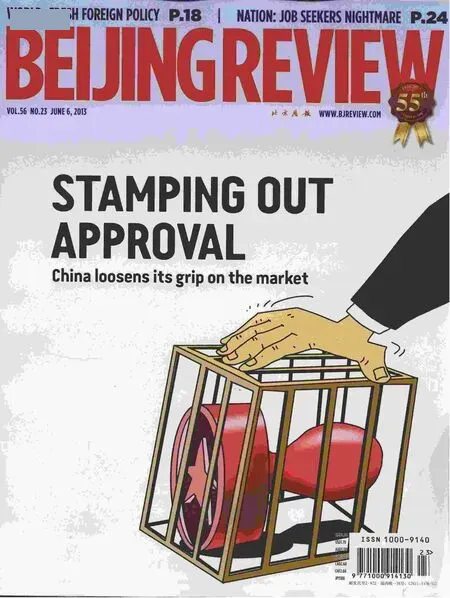Should Temples Charge Entry Fees?
From May 10, visits to 29 temples in central China’s Hunan Province are free of charge. This was a decision made by a group of Buddhists, led by Master Shenghui,Vice Director of China Buddhism Association.
Prior to this, some temples, such as Guanghua Temple and South Putuo Temple in Fujian Province and Ciyun Temple in Chongqing, also ceased charging for entry since April.
Ticket income makes up revenue for daily temple operation, but entry fees also keep many Buddhist believers out of temples. The free entrance campaign has thus gained wide support from the public as a measure to resist the commercialization of temples. The following are excerpts of opinions:
Kauangdaanxiaofeng (people.com.cn):The cancellation of entrance fees to temples is praiseworthy. Because of free entry, more people will visit temples to pay tribute to Buddha and learn about the religion. Subsequent economic loss can be made up in other ways. It is indeed necessary to prevent excessive commercialization of temples.
Xie Yong (The Beijing News):The campaign to make temple entry free is a great means to restore temples to their original status—not moneymaking scenic spots, but holy religious places,where monks keep religious doctrines alive.
It is an abuse of market rules to impose temple entrance fees on visitors. The fact that temples are religious facilities demands that they be open to all.
These temples in Hunan are showing an increasing sense of independence as social organizations. Meanwhile, local governments have also realized the distinction between themselves and temples and will not intervene in the latter’s affairs in terms of entry fees. For temples, the top priority is to win trust and credit from believers. To profit via ticket sales may be good in the short term, but will damage the credibility of Buddhism over time.The government needs to transfer some interests to temples and help restore them to their original function.
In Taiwan, religious facilities are free.Comparatively speaking, on the mainland, due to the involvement of local governments and even companies in temple operations, the situation has become rather messy. While losing credit, temples are used by local interest groups as a tool to profit.
The existence of religious organizations, from a secular perspective, should address bad and ugly social behavior while improving human nature. The move of the temples to stop charging entry fees is setting an example for the rest of society.
Zou Tongqian (chinanews.com):Today, the most serious damage done to Buddhist temple credit does not concern ticket sales, but business involvement, which is deepening commercialization. When religion becomes a commodity, the damage to it is enormous.
Buddhist master Xingyun (brjsw.cn):It’s improper for Buddhist temples to charge entry fees. As cultural and historical relics, these facilities belong to society and should not be a source of income.
Shi Jia (Guangming Daily):My sincere admiration goes to Master Shenghui and all other abbots who jointly launched this campaign in a time of excessive commercialization among temples. At least in Hunan Province, popular temples have thus managed to maintain their cultural core.

Commercialization of temples is widespread across China, with entry fees effecting visitors and believers alike. This has damaged the religious nature of such facilities and has led to widespread complaint amongst the public.
However, ticketing is only the tip of the overall commercialization iceberg. Compared to entry fees, the complex commercial operations based on temple culture is even more difficult to deal with. For example, believers and visitors, apart from paying entry fees, have to donate cash when taking part in temple activities.
Commercialization can be blamed on travel packages and industrial management offered by profit-minded companies that have no respect for faith or culture. Temples are gradually being stripped of their cultural content. Businesspeople don’t think twice before using temples to make money. Moreover, some local governments count temple profits as part of their regular revenues.Both cases have an extremely adverse impact on public opinion.
When developing public tourist attractions such as famous mountains and ancient temples,public opinions should be respected.
Qiao Taishan (blog.sina.com.cn): After the Jiulian Mountain in central China’s Henan Province stopped charging entry fees in September last year,the temple received about 600 pilgrims and visitors within three days, several times more than usual.
Nowadays, temples are all actively involved in commercial activities, with visitors easily charged high entry and all kinds of other activity fees once within.
Originally, Buddhist temples were built by believers and kind people, and they are supposed to feed back to ordinary people. Pilgrims are willing to donate to temples, which is generally enough to support daily operations there.
Temples are religious facilities used to educate people and where believers can hold relevant events. I used to visit many famous churches, like Notre-Dame de Paris and St. Peter’s Basilica in the Vatican. I’ve also visited many mosques. None of these ask entry fees. Why are China’s Buddhist temples doing so?
The famous Shaolin Temple in Henan Province has failed in its two bids for inclusion into the list of World Intangible Cultural Heritage.Excessive commercialization is to blame. . ■

